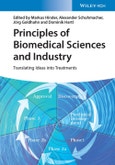Principles of Biomedical Sciences and Industry
Improve your product development skills to bring new ideas to biomedicine
The development of innovative healthcare products, such as biodegradable implants, biopharmaceuticals, or companion diagnostics, requires a multi-disciplinary approach that incorporates scientific evidence with novel and innovative ideas to create new and improved products and treatments. Indeed, product development and the integration of science with commercial aspects have become key challenges for scientists working in the pharmaceutical, biotech, and medtech industries.
Using a multi-pronged approach to development, Principles of Biomedical Sciences and Industry combines ideas and methodologies from four of the central areas of focus in the biomedical arena: pharmaceuticals, diagnostics, biomaterials, and medical devices. In doing so, the book covers the entire product lifecycle, from translating a scientific idea into a prototype to product development, launch, and management.
Principles of Biomedical Sciences and Industry readers will also find: - Several case studies from the most important product categories (pharmaceuticals, diagnostics, medical devices, combination products) - Chapters dealing with toxicology and safety risks in development, as well as regulatory approval - Key business aspects including how to secure funding, managing intellectual property, and price regulation in the market - An ideal resource for teachers and students that conveys the information in an easily-digestible format
Ideal for advanced students and young professionals pursuing a career in the biomedical and healthcare industries, Principles of Biomedical Sciences and Industry is an essential reference for those in pharmaceutical industry, biotechnologists, medicinal chemists, bio-engineers, pharma engineers, and management consultants.
Improve your product development skills to bring new ideas to biomedicine
The development of innovative healthcare products, such as biodegradable implants, biopharmaceuticals, or companion diagnostics, requires a multi-disciplinary approach that incorporates scientific evidence with novel and innovative ideas to create new and improved products and treatments. Indeed, product development and the integration of science with commercial aspects have become key challenges for scientists working in the pharmaceutical, biotech, and medtech industries.
Using a multi-pronged approach to development, Principles of Biomedical Sciences and Industry combines ideas and methodologies from four of the central areas of focus in the biomedical arena: pharmaceuticals, diagnostics, biomaterials, and medical devices. In doing so, the book covers the entire product lifecycle, from translating a scientific idea into a prototype to product development, launch, and management.
Principles of Biomedical Sciences and Industry readers will also find: - Several case studies from the most important product categories (pharmaceuticals, diagnostics, medical devices, combination products) - Chapters dealing with toxicology and safety risks in development, as well as regulatory approval - Key business aspects including how to secure funding, managing intellectual property, and price regulation in the market - An ideal resource for teachers and students that conveys the information in an easily-digestible format
Ideal for advanced students and young professionals pursuing a career in the biomedical and healthcare industries, Principles of Biomedical Sciences and Industry is an essential reference for those in pharmaceutical industry, biotechnologists, medicinal chemists, bio-engineers, pharma engineers, and management consultants.
Table of Contents
THE BIOMEDICAL INDUSTRYMaterial science industry
Diagnostics industry
Medical technology industry
Pharmaceutical industry
THE LONG WAY TO LAUNCH A NEW PRODUCT
The standardized R&D process
Drug Discovery: From idea to candidate
Drug Development: From prototype to product
The Impact of translational science
Market launch and product LCM
Impact of quality management
The regulatory framework
Case-in-point: The R&D process in medical devices and technology
Case-in-point: The R&D process in (mobile) diagnostics
STRATEGIC R&D MANAGEMENT
The what and how of the industry
Portfolio assessment
Portfolio management and decision making
Technology Management
Project management
IP management
REAL LIFE IN THE INDUSTRY -
APPLICATIONS IN LIFE SCIENCE
Studies of success and failure
Today's challenges and future trends








